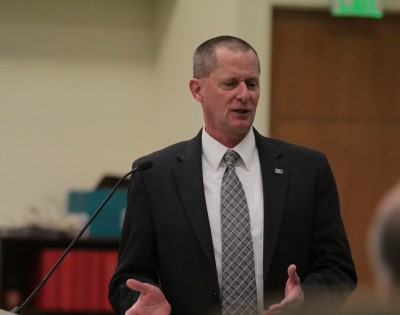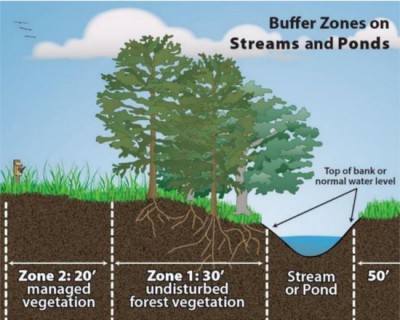RALEIGH — The N.C. Department of Environmental Quality won’t push for legislation this session to alter longstanding water quality rules, but could pursue future changes on stormwater, nutrient loading and buffer regulations, a department official told Coastal Review Online this week.
Crystal Feldman, DEQ’s deputy secretary for public affairs, said in an email response that comments made Feb. 10 by Assistant Secretary Tom Reeder before the legislature’s Environmental Review Commission did not mean there would be a new push for changes by the department. Rather, she said, DEQ is still in the process of reviewing all of its water quality standards under an ongoing review of all rules mandated by the legislature in 2013.
Supporter Spotlight

In a series of briefings to the commission, Reeder, who previously headed up the Division of Water Quality, sharply questioned the effectiveness of buffer rules put in place 15 years ago for the Tar-Pamlico and Neuse River basins and other controls and regulations to reduce the amount of nutrients in rivers and waterways.
“I don’t see any kind of effectiveness to these buffers in terms of either maintaining load or decreasing a load of nutrient into the estuary. It is the reason we use to claim all these 98 miles of private property in the Tar-Pam and tell these people what they can do with their land.” he told the commission. “To me this raises a lot of questions. These programs have been in place for about 15 years now. I think maybe it’s time we took a look at them.”
Reeder said the buffer rules have been among the most controversial he’s studied and he questioned whether they were worth the trade-offs.
“The question is ‘are they a net benefit?’ because, just to be honest with you, these buffers cost people a lot of heartache and I’d like to think that for all the trouble we’re causing, we’re getting our bang for the buck.”
Rep. Pricey Harrison, D-Guilford, disagreed with Reeder’s assessment, saying the number of fish kills and other events have been reduced.
Supporter Spotlight
“I think we all want effective regulations,” Harrison said. “I do remember the fish kills of the ’90s on the Neuse River and everyone in that river basin being impacted by it.”
Reeder’s comments drew similarly sharp criticism from environmentalists, who accused him of encouraging legislators to eliminate or weaken longstanding environmental protections. Coastal Review Online requested an interview with Reeder about his remarks, but was asked to send questions to the department’s public affairs office instead.

Reeder continually asserted that there had not been substantial improvements to the two watersheds and questioned whether implementing similar measures to help clean up Jordan and Falls Lake near Raleigh were worth the cost.
“No sense in us beating our heads against the wall with these non-point source controls that are going to cost these local governments billions of dollars if there’s no track record of success for them.”
He said the poor design of the lakes may make it impossible for them to ever to be in compliance with the federal Clean Water Act.
Legislators are considering a request to delay some of the implementation of rules intended to help clean up Falls Lake, a move similar to moves to halt similar rules for the Jordan Lake watershed two years ago.
“What we have to ask ourselves is ‘Do we want to continue down this track of spending money when we don’t know what the outcome is going to be?’” Reeder said. “Based on to the Neuse and Tar-Pam it doesn’t look like it’s probably going to work.”
Environmental advocates cautioned commission members against moving too quickly to undo the water quality protections. Tom Bean, a lobbyist for Environmental Defense Fund and the N.C. Wildlife Federation, said the effort to clean up the Neuse estuary was a long political process meant to “share the pain fairly” among local governments, agriculture and developers. He cautioned the commission not to look at any one element in isolation.
“You run the risk of only seeing the cost and not the benefits,” he said. “Be very careful before taking any element out or whittle away at them.”
Molly Diggins, executive director of the North Carolina chapter of the Sierra Club, said given Reeder’s long history with the state water quality protections, she was shocked he was so dismissive of their effectiveness.
“It was really over the top,” she said. “You have to wonder if he was under pressure to make that case.”
Reeder, she said, seemed to be saying “it’s not a big deal to just walk away.”
Coastal Stormwater
DEQ officials have few specifics on one study of water protections that is expected this spring. Reeder told commission members last week that he expects to wrap up a coastal stormwater study by the April 1 deadline mandated in last year’s Regulatory Reform Act.
Coastal legislators Rep. Pat McElraft, R-Carteret, and Sen. Harry Brown, R-Onslow, both asked for the study as part of rollback of density standards adopted in 2006. Brown and McElraft have complained that the standards, which reduced the percentage of buildable area before stormwater controls are required from 25 percent to 12, are too stringent.
Reeder, who led a previous state study that found that old standards were not protecting shellfish waters, would have to sign off on the change.
Feldman said she also expects the study to be completed on time. The review, she said, was being conducted in-house and would not include meetings with stakeholder groups.
“This is a scientific review being performed by DEQ stormwater engineers and specialists” she said. “There have been no stakeholder meetings associated with this study.”







